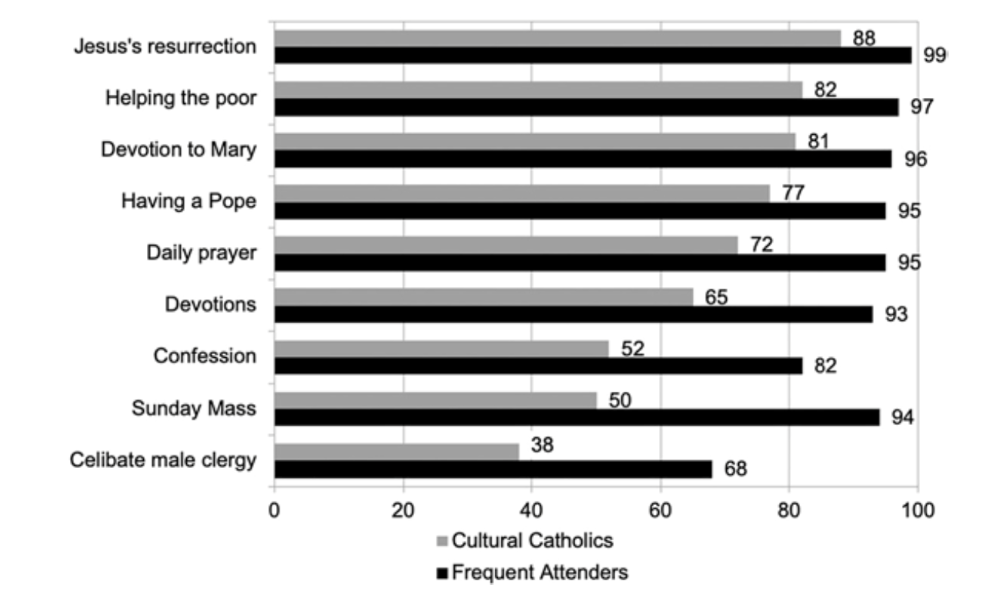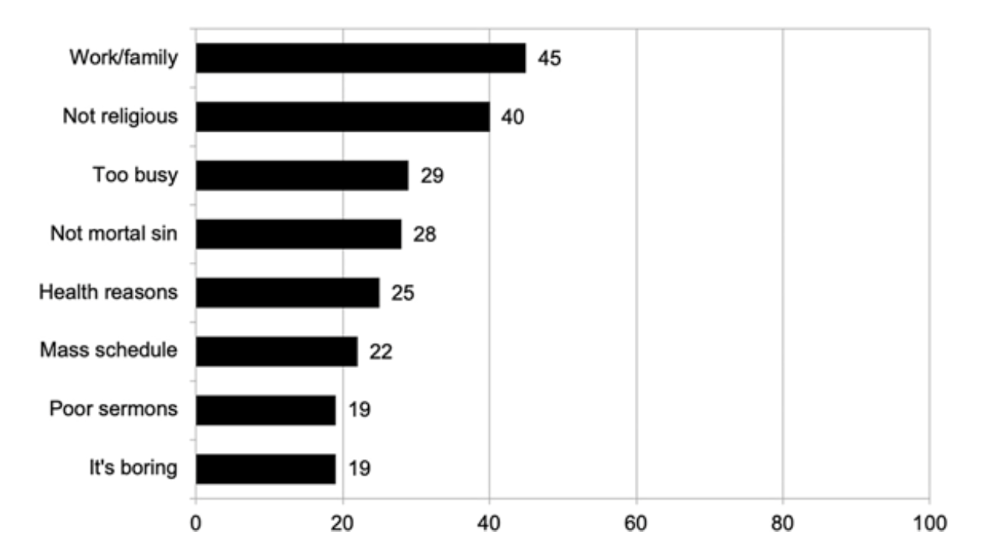Fr. Bob Kabat, pastor of St. Matthew Parish in Allouez, Wis., distributes ashes to a young child during Ash Wednesday Mass Feb. 14. Some 53% of American Catholics are "cultural Catholics" who attend Mass "a few times a year" or "seldom or never," while 47% attend monthly or more often. (OSV News/Sam Lucero)
What matters most when we reach out to Catholics who do not attend Mass regularly (aka "cultural Catholics")? Everything.
It's not just the right words, careful timing, thoughtful stories, our tone and everything else; it's all of it. Add to the top of the list how we personally live our Catholic faith in our everyday lives, and we have the short list of what matters when trying to connect with our friend, sibling, co-worker, adult child or whomever it might be as we hope to enliven their faith.
Spreading the good news is no simple or one-size-fits-all matter, but in doing the research for my new book comparing the 53% of American Catholics who attend Mass "a few times a year" or "seldom or never" with the 47% who attend monthly or more often, I've learned a lot about cultural Catholics and want to share a few findings and offer some ways we might better reach them.
First, there are some notable areas in which cultural Catholics demonstrate, perhaps surprisingly, high Catholic belief and practice. In asking if certain beliefs are "essential" or "somewhat essential" to the Catholic faith, more than three-fourths of cultural Catholics say this of Jesus' physical resurrection from the dead (88%), helping the poor (82%), devotion to Mary (81%) and having a pope (77%). These percentages (and many of the others in this article) are lower than frequent attenders' percentages, but they still reveal a strong pull toward certain core Catholic beliefs.
Frequent Mass attenders are more likely to agree with the church teaching than cultural Catholics, regardless of whether it is a "blue" or "red" issue.
For those concerned about cultural Catholics' desire to pass the faith to their children, there is good news: 62% of cultural Catholics agreed that it is important to them that future generations of their family remain Catholic. The unknown question is how well equipped are these Catholics to actively pass their faith along. A heartening finding was another 62% agree that the sacraments are important to their relationship with God. Although these Catholics are not receiving the Eucharist regularly, this demonstrates that rites like baptism, first Communion and matrimony are still important to them and for their children to receive.
And many cultural Catholics see themselves as firmly planted within Catholicism. When asked how likely they are to leave Catholicism on a 1 ("I would never leave the Catholic Church") to 7 ("Yes, I might leave the Catholic Church") scale, 27% chose 1, 18% selected 2, 10% said 3, and 19% responded 4, with only 26% spread across the final three choices.
At the same time, there are some areas that reveal they are very loosely tethered. For instance, although 12% say the Catholic Church is either "the most" or "among the most" important parts of their life, 42% say "quite important to me, but so are many other areas of my life," 35% respond, "not terribly important to me," and a final 11% say "not very important to me at all."

A question researching cultural Catholics asked, "As a Catholic, how essential is each of these to your vision of what it means to be Catholic? Would you say the following is or are essential to the faith, somewhat essential, or not essential at all?" ("Somewhat essential" and "Essential" combined.) (Courtesy of Liturgical Press)
They are less likely to show that church teaching on political issues makes a difference to their own opinion. Frequent Mass attenders are more likely to agree with the church teaching than cultural Catholics, regardless of whether it is a "blue" or "red" issue.
For example, 44% of cultural Catholics agree with the church's opposition to the death penalty, compared to 60% of frequent attenders. And 79% of cultural Catholics support access to euthanasia for those "who are terminally ill and in great pain" while only 48% of frequent attenders do. And cultural Catholics are less involved than frequent attenders in their local communities, too.
Fortunately, they report overall positive experiences of parish life. Although they are more likely than frequent attenders to say that parishes are too big and impersonal (50%) and that church leaders are out of touch (64%), a full 84% believe that parish priests do a good job.
When asked why they don't attend Mass more frequently, two answers rise to the top. First, 45% of cultural Catholics say work or family obligations pull them away. Parish leaders might consider how they can demonstrate the relevance of parish involvement for stronger families and a sense of vocation to one's occupation, especially on days like Christmas and Easter when more cultural Catholics are in attendance. For example, they might announce the various family- or kid-friendly activities your parish will host on each of the 12 days of Christmas.
Second, 40% say they do not attend Mass more often because they are simply not a religious person. I wonder where we went wrong with so many; when did we fail to show them the meaning and purpose and God's in-breaking in countless ways in our lives? Of course, we are all religious persons. Some of us simply have yet to discover this. How might we change course and make this more obvious in faith formation programs?

A question researching cultural Catholics asked, "Is there a particular reason why you don't go to Mass more often? Please indicate whether or not each of the following is an important reason you don't attend Mass more often: Work/family responsibilities; just not a religious person; I'm too busy; it's not a mortal sin to miss Mass; health reasons; inconvenient Mass schedule; sermons are poor; it's boring." (Respondent could choose multiple reasons.) (Courtesy of Liturgical Press)
These are just a few of the findings I uncovered in my analysis. But a big question we each face in this data is what can I do about it? Not, "What new program should my diocese or parish start to address this?" Yes, that is an important question, especially for those in ministry, but it is not the question for all of us. Instead, we must each ask, "What can I, what can each and every one of us do for the cultural Catholics in our own personal lives?" How do we accompany our parents, neighbors, godchildren, friends and all the rest? Here is how I would begin:
- Create a space of belonging in your personal life. Regardless of differences in faith experiences or religious disagreements, those we love need to know that they belong in our lives unconditionally. We want people in our lives to know that they are needed and trusted. This is an end in itself. Spaces of belonging and trust are also places in which we can be open and vulnerable, and this is where transformation and new beginnings — both large and small — can happen.
- Be curious. Although I shared a number of statistics, every person is unique. Once the cultural Catholics in your life have a firm sense of belonging, ask them why they stopped attending Mass more frequently. Make sure you ask this in a way that shows genuine curiosity and has no whisper of accusation. Maybe they simply drifted, perhaps they have a strong disagreement with a church teaching, maybe they had a bad experience. Whatever the case, ask questions that show you care about them and their faith life.
- Listen. Like, really listen. Don't listen for the sake of a rebuttal. Listen for the sake of understanding. Listen for the sake of encounter. Hear the apathy or anger or hurt or whatever it is coming out of the person before you, and empathize with their experience. Later, pray and discern how your perspective might be widened in this encounter. Contemplate what they need from you and how you might offer them that. When all is said and done, be humble.
- Be aware. When facing a difficult decision, 81% of cultural Catholics turn to close family and another 74% turn to trusted friends. Every once in a while, we get these sacred opportunities to enter into a vulnerable space with those we love. We can bring the wisdom of our faith and experiences into these in ways that do not tell the person what to do, but illuminate ways forward in their discernment. We don't get to pick when we are relevant to people, but we do get to choose how well we will listen to the hopes and fears of those who trust us. We need to be better listeners than talkers when we are invited into these graced moments.
- Create more spaces for belonging in the parish. Ask yourself what next steps might be spiritually life-giving to the person you've encountered and are accompanying. The first step might not be Mass. Perhaps you are a part of a faith-sharing group you could invite them to. Maybe they can help you and some other parishioners sort food and deliver holiday baskets. Or it might be less religiously explicit, like babysitting help, connections to your diocese's mental health ministry, or help getting their credit in order.
- Don't assume that what connects you to God will be the first spark for them. And remember that God wants to connect to every aspect of our lives. Be attentive, including hearing their polite "No thanks." Be faithful to them and to God and keep the needs they name and their sense of belonging primary.
- And be kind to yourself. None of this is easy or straightforward, but there is a lot of grace in taking risks, being bold and acting with immense love.





